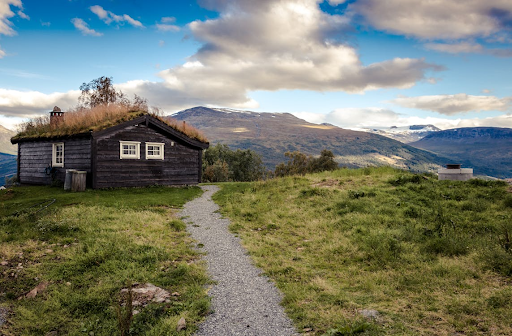Introduction: The Future of Travel Is Sustainable
Picture this: You're sipping your morning coffee on the veranda when a deer quietly appears just outside the window. The air is fresh, the birds call in the distance, and the world feels perfectly still. Your coffee? A freshly brewed cup made from beans roasted locally just for you, and yes, they're fair-trade.
Inside the cabin is warm and inviting, making you feel right at home. A cabin heated by a log-burning stove, built from reclaimed wood, and insulated with natural materials.
This isn't your typical holiday. It's slower, simpler, and more meaningful. This is the future of travel.
The future of travel is thoughtfully designed to restore you and the world around you. But what does that mean?
What is Sustainable Travel?
"Sustainable travel is minimising the negative impacts of travel on the environment while maximising positive impacts."
Sustainable travel is experiencing the world, making a positive impact on both the planet and the people living in it. It's about embracing responsible travel practices like choosing eco-stays, dining out locally, shopping from local shops, and looking after the natural environment, which collectively make a significant difference. Whether you're planning a romantic getaway, just a cosy stay at a log cabin, or exciting nature-based holidays with your friends and family, every small choice you make can add up to a big impact.
Think of it like this: you’re having an amazing trip, and at the same time, you’re helping to keep beautiful places beautiful for everyone who comes after you.
Throughout the UK, a green revolution is unfolding. Sustainable travel is on the rise, as more people avoid polluting holidays in favour of eco-friendly escapes that benefit the planet as much as they refresh the soul. Indeed, almost 64% of UK travelers now state that they desire to make increasingly sustainable travel arrangements, a change that's revolutionizing everything from transportation to accommodation, dining, and sightseeing.
What does it mean to travel sustainably?

At its heart, eco-friendly travel is about minimising harm and maximising positive impact on the environment, on local communities, and even on your own well-being. Whether it’s choosing a train over a flight, staying in an eco holiday cottage that uses solar power and rainwater harvesting, or shopping at a village farmers’ market instead of a chain store, your decisions shape the future of tourism.
This guide is your compass to greener travel across the UK. We'll explore how to plan and enjoy sustainable escapes, from low-impact travel tips and local food experiences to finding the best eco-friendly stays in nature-rich regions like Scotland, the Peak District, the Lake District, and Wales. Along the way, you will find inspiration for travelling during the off-peak season and discover how even your packing list can reflect your values.
So, question yourself: what if your next vacation not only recharged you, but also restored the planet?
If you've ever fantasised about waking up in a solar-powered cabin in Scotland or camping under the stars in an off-grid meadow, you're already on the right track. Let this guide take you the rest of the way.
Why Sustainable Travel Matters?
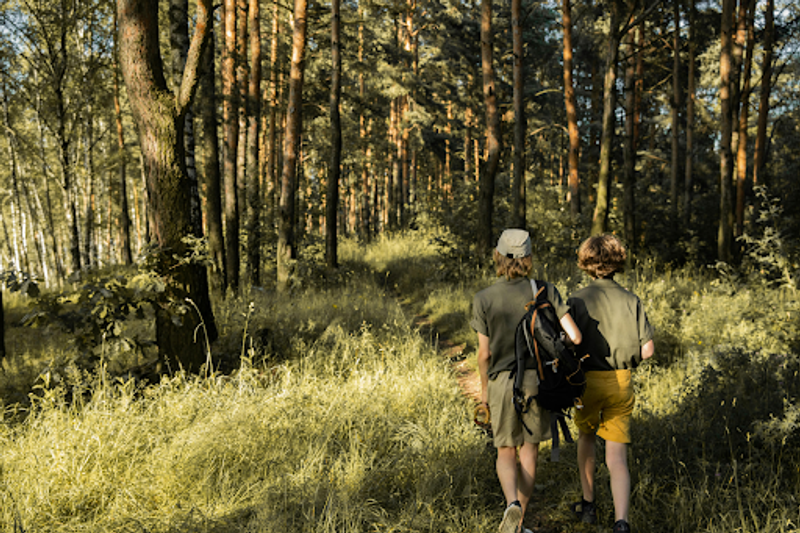
Typical holidays may seem harmless, but they quietly contribute to pollution, overcrowding, and the degradation of natural and cultural spaces. Eco-friendly travel offers a better way that is slower, reduces impact, supports local communities, and protects ecosystems. Simple choices like taking trains, packing sustainably, and staying in Eco-stays make a real difference.
It's not about being perfect; it's about being mindful. When we travel with care, the experience becomes richer, not just for us but also for the planet.
The Hidden Cost of a “Typical” Holiday
Let's flashback to a typical vacation situation.
A short flight to a large city, jam-packed bags, a hotel full of buffet remnants, and daily laundry routines. Now scale that scene by millions of tourists annually, and it becomes obvious, ‘conventional tourism is quietly driving a worldwide crisis’. Tourism is responsible for almost 8% of the planet's carbon emissions, much attributed to transportation, overuse, and unsustainable lodging.
More Than Emissions: The Real Impact of Over-tourism

But the damage doesn't end there. Overtourism leads to overcrowded destinations that strain local infrastructure and disrupt the daily lives of residents. Natural landscapes are being degraded to make way for resorts and roads, while precious resources like water and energy are overused to meet short-term tourist demand. Pollution from transport, plastic waste, or untreated wastewater often overwhelms local ecosystems. In many cases, the economic benefits promised to communities aren't fulfilled, leaving them to bear the consequences of the environmental and social impact.
But there is another way of experiencing the world that helps us explore more, travel lighter, and contribute to the world, and is much more fulfilling.
A Glimpse into Low-Impact Travel
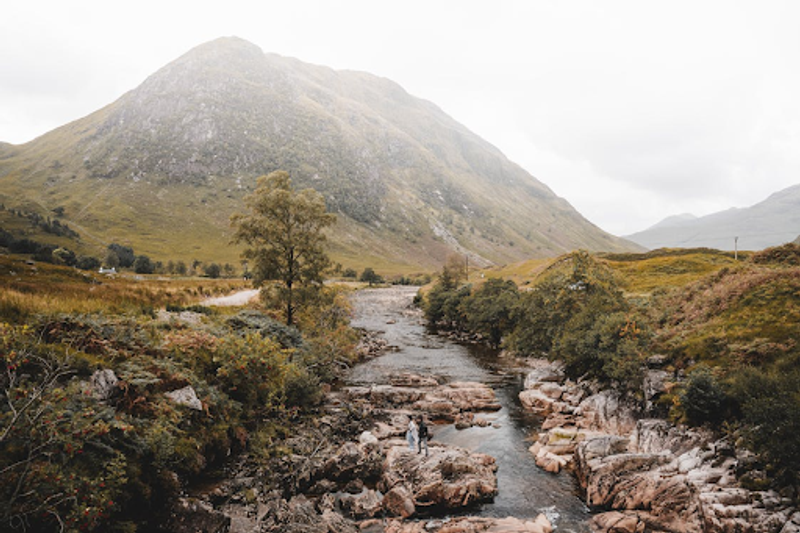
Imagine this: you catch a train to Scotland, your bag packed with layers, a refillable water bottle, and natural ingredient toiletries. You lodge in a cottage that harvests rainwater, is powered by solar panels, and gets its breakfast from local farms. You spend your days hiking through scenic trails and wandering through local markets, where the souvenirs you bring home are handmade by local artisans. This kind of travel doesn't just reduce your footprint; it strengthens communities, protects the environment, and offers a more meaningful, grounded experience.
This is not just a holiday, it's low-impact travel in action. You are making thoughtful choices at every step. It's all about intentionally reducing your impact along the length of your trip, from the transportation you use to how you pack and interact with the places you go.
The Power of Planning Ahead
Smart planning makes a significant difference in your carbon emissions. Choosing destinations nearer home, visiting in the off-season, and staying longer all contribute to minimising your environmental impact. A growing number of experienced travellers prefer to take slow, locally oriented trips instead of long, high-impact trips.
And how you get there matters, too. Public transport, especially trains, has become an increasingly popular choice for those looking to reduce their emissions. In fact, for many routes across the UK, trains are not only more scenic and stress-free, they’re significantly greener than cars or short flights.
Even what's in your suitcase can shift the equation. Essentials like reusable cutlery, eco toiletries, and reusable bottles and mugs help cut down on plastic and waste. Combined with simple habits like choosing seasonal meals, saying no to unnecessary packaging, and supporting local shops, you start to see how responsible and sustainable travel can become second nature.
Can Travel Ever Be Zero-Emission?

If you're still wondering whether it's possible to travel with zero emissions, the reality is, 'not entirely.' Even the most mindful journey will leave a footprint behind. That's where carbon offsetting comes in. It allows travellers to balance out unavoidable emissions by supporting environmental projects that absorb or reduce carbon elsewhere. In the UK, this could mean contributing to initiatives like tree planting, peatland restoration, or wetland conservation projects that store carbon and support biodiversity and climate resilience.
While achieving a zero-emission trip may not be possible, you can significantly lower your carbon footprint by up to 90% by making responsible, eco-conscious choices like choosing slower, land-based travel, using public transportation, staying at eco-friendly accommodations, and supporting local conservation efforts. These are all core elements of responsible travel, where every decision is made with environmental and community impact in mind.
Sustainable Travel Matters
- Reduces Environmental Damage - Sustainable Travel focuses on low-emission transport, eco-stays, and cuts waste, keeping the air cleaner and protecting resources.
- Protects Natural Landscapes - Eco-travel avoids overdevelopment by supporting local stays and encouraging activities like hiking, wildlife watching, and cycling, which help preserve natural ecosystems.
- Supports Local Communities - Staying, eating, and shopping local supports local families and keeps traditions alive, lifting the spirit of the local community.
- More Meaningful Experiences - Eco-travel encourages slowing down and connecting with people and places. It's not about ticking boxes, but about making your journey count for you and the place you're visiting.
- Better Future for Travel - Travel isn't going away, but how we travel can change to keep our destinations pristine. Every small choice, train over plane, refillable bottle over plastic, local stay over a chain hotel, adds up.
Sustainable travel isn't about chasing perfection; it's about embracing consciousness. Each thoughtful gesture, each considered decision, is a vote for a better, more respectful way of exploring the world. Compared to conventional travel, which often overlooks environmental and cultural impact, eco-friendly travel invites you to connect more deeply with local communities, protect natural landscapes, and experience destinations more authentically. It's not just better for the planet, but also for you, adding more meaningful adventures, personal growth, and memories that last far beyond a typical tourist trip.
That's the magic of travelling differently: when you walk lightly, you feel more deeply and leave the places you love just a little better than you found them.
What Makes Travel Eco-Friendly?
Sustainable travel isn't one big action; it's made up of small, thoughtful choices. It begins before you even pack your bag, with decisions that shape how far you go, how you get there, and how lightly you tread on the planet once you arrive.
How you get there matters.
One of the biggest travel decisions? Your mode of transport.
If you’re planning a trip from London to Edinburgh, you might be tempted to fly to save a couple of hours. But here’s why the train is the smarter, greener choice, not just for the planet, but for the experience too.
Imagine this: rather than racing through airport queues and missing out on the journey, you're sitting by the window watching rolling hills, historic towns, and open countryside pass you by. That’s the beauty of slow travel — and it comes with a major carbon-saving bonus.
Carbon Emissions: Train vs. Plane (London to Edinburgh)
- Flying: ~255g CO₂ per passenger per kilometre (total: 159.8 kg)
- Train travel: ~41g CO₂ per passenger per kilometre (total: 20.7 kg)
Carbon savings: Around 87% less CO₂ by choosing the train (Source: Trainline carbon emissions calculator)
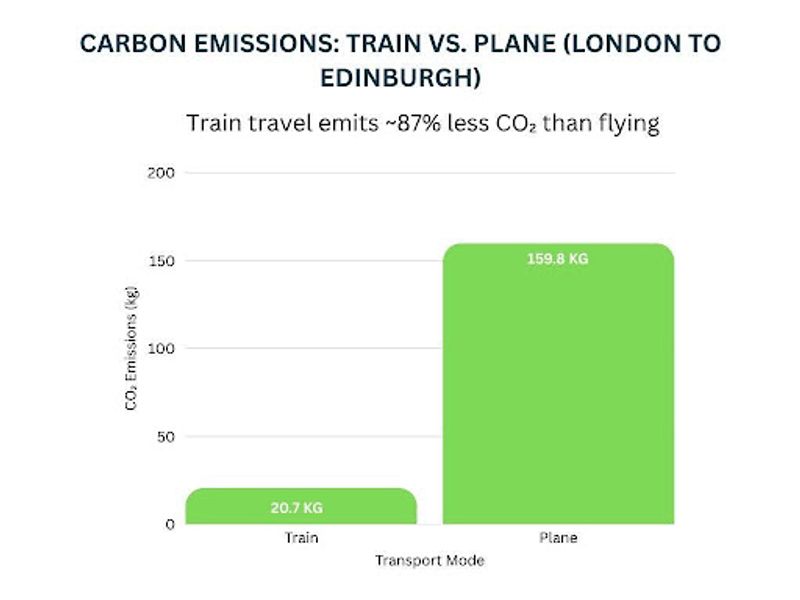

Train travel isn’t just more sustainable, it’s also more relaxing, scenic, and often more reliable than air travel for domestic UK routes. Whether you're headed for a weekend in Edinburgh or a longer Scottish adventure, taking the train helps you travel with purpose and perspective.
Check out our train vs car travel guide to compare emissions, cost, and convenience.
Where You Stay Matters
Your accommodation isn't just a place to sleep; it has a significant effect.
Eco-conscious stays, like solar-powered cottages, cabins made from reclaimed materials, or farm-to-table B&BS, go beyond comfort. They support local ecosystems, reduce waste, and promote sustainable building and living practices.
Not sure where to start? Look for stays that take eco-measures like:
- Motion sensor lights
- Organic or Local Food
- Green building
- 100% renewable energy
- Solar thermal panels
These accommodations are often tucked away in stunning natural settings, places that remind you why this kind of travel matters. At My Eco Escape, we only list eco-friendly holiday homes that are carefully handpicked. Check out our destinations.
The activities you do while travelling matter.
Being a responsible traveller doesn't stop at transport and lodging. What you do once you arrive also makes a huge difference.
Choose eco activities like:
- Guided forest walks
- Wildlife safaris led by conservationists
- Stargazing or foraging workshops
Many Eco Escapes also invite you to spend time on the land itself. That might mean joining a morning round to feed the farm animals, helping plant native trees, or simply taking a moment to enjoy a quiet walk alongside curious sheep or grazing deer. These little interactions ground you in the present. They remind you that travel isn't just about ticking places off a list; it's about becoming part of something, even for a short while.
These not only create memorable moments but also support local conservation efforts. On top of that, look for community-led experiences, markets, cultural tours, or cooking classes that directly benefit local people.
Waste Less, Travel Better
Bringing a reusable water bottle or cutlery set might not feel revolutionary, but when millions of people do it, the impact is huge.
Here's how you can reduce waste while travelling:
- Carry a reusable water bottle, tote bag, and coffee cup
- Use electronic guides instead of printed brochures
- Refill shampoo and soap containers instead of buying new ones.
- Always use public bins and recycling where available.
Small shifts in your packing list can help decrease the plastic use that goes to landfills every year and reduce the pollution caused to nature and local communities.
Go beyond Minimising Your Impact
Responsible travel is about making sustainable choices that reduce your environmental impact right from the beginning. Travel slower and by land, stay in sustainable stays, support the local community, and be conscious of your resource usage. Every choice counts in safeguarding our planet.
To enhance your positive footprint, responsible tourists can also give back to trusted environmental initiatives that restore and safeguard critical ecosystems. In the UK, numerous programs invite support for projects like tree planting to offset carbon and reclaim native forests, wetland and peatland restoration to store carbon and enhance biodiversity, and rewilding initiatives to reclaim natural habitats and enhance climate resilience.
Sustainable, responsible travel doesn't stop when the journey's over. It tends to create lasting positive changes in daily life. From local shopping, tree planting, and supporting small-scale farms to walking and spending time with nature, every little bit helps build a better world. Responsible travel is not only great for the visitor; it's transformative for the destinations we care about and wish to preserve.
The Bottom Line: Conscious Travel Leaves a Better Mark
Sustainable travel is a mindset, not a sacrifice.
It's about thinking before acting; being curious instead of careless, and choosing experiences that feel just as good for you as they are for the world around you.
And when done well, it doesn't feel like a compromise; it feels like travel at its best.
Reflective, rewarding, and worth remembering!
Ultimately, sustainable travel is about intent. It's a mindset that recasts the whole experience, from how you get around to how you connect to the legacy you leave behind.
And if done beautifully, it's never a compromise. It's enlightening and well worth recalling.
How the UK is Embracing Sustainable Tourism
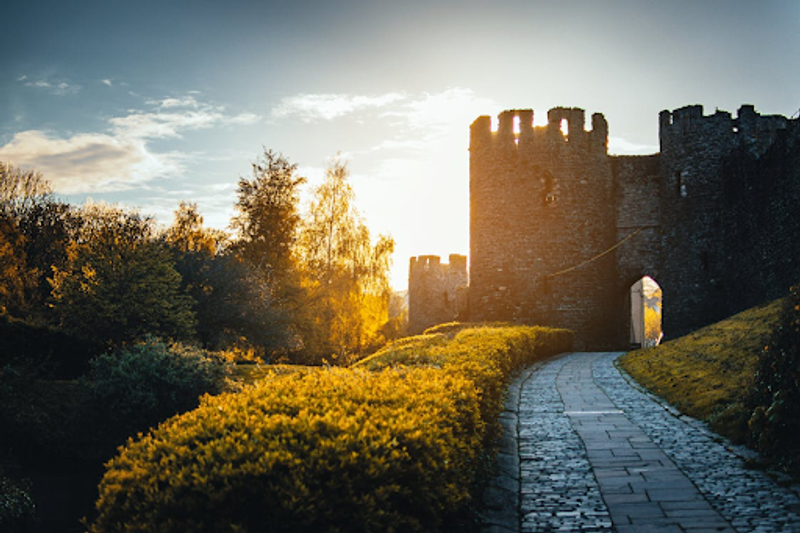
All across the UK, a gentle but powerful shift is happening.
It's the kind of change you notice when you swap a busy hotel reception for a glamping pod surrounded by wildflowers, or when your morning alarm becomes birdsong echoing through a woodland hideout instead of city traffic.
This isn't just another passing trend; it's part of a growing movement. From national parks to coastal villages and rural towns, the UK is turning into a living experiment for sustainable travel. Everything from how people move around to where they sleep and eat is being reimagined in a greener, slower, and more mindful way.
Between July 2019 and January 2025, an online survey was conducted to explore whether travellers in Great Britain were choosing eco-friendly hotels to help reduce their environmental impact. In January 2025, the share of travellers considering using eco-friendly hotels stood at 35 per cent.
Sleeping Sustainably: Eco-Friendly Accommodations
Let's start with where people are staying.
There’s been a real rise in eco-friendly stays in the UK, from solar-powered shepherd huts and off-grid cabins to farm retreats where you can enjoy fresh eggs for breakfast or pick your herbs for dinner.
And then there’s glamping. Once seen as a short-term fad, glamping has now exploded in popularity. Curious where to try it for yourself? Explore our list of the Top 10 Glamping Pods in the UK, handpicked for their eco credentials, stunning locations, and unique charm.
The UK glamping market size was estimated at USD 209.8 million in 2023 and is expected to grow at a compound annual growth rate (CAGR) of 10.7% from 2024 to 2030.
Most glamping stays have a larger environmental footprint than traditional hotels. They often use renewable energy, composting toilets, and green building designs that blend into the natural landscape instead of dominating it.
Glamping vs Hotels: A Clear Difference
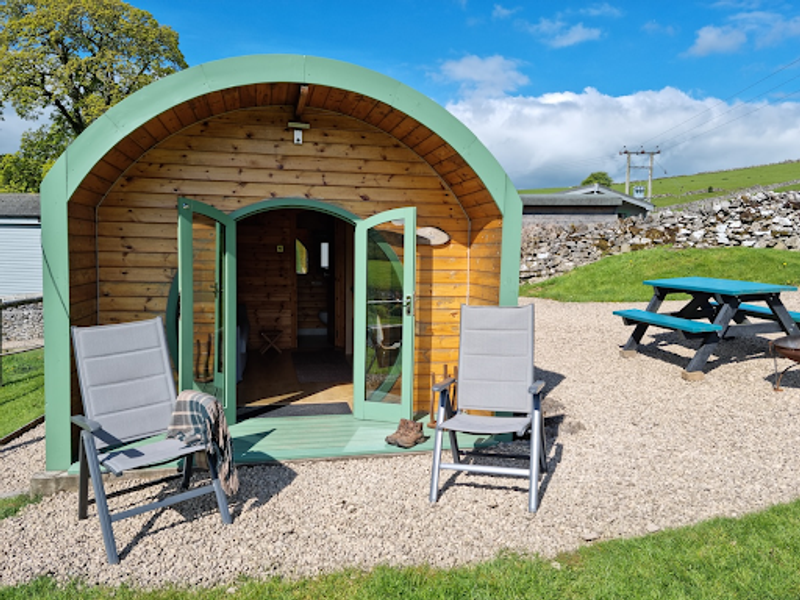
Unlike most hotels, which rely heavily on things like constant heating, daily towel washing, and energy-hungry buildings, glamping sites are designed to tread lightly on the earth. Where hotels might churn through hundreds of litres of water a day per guest, eco-campsites are much more mindful, encouraging shared resources and closer connections with nature.
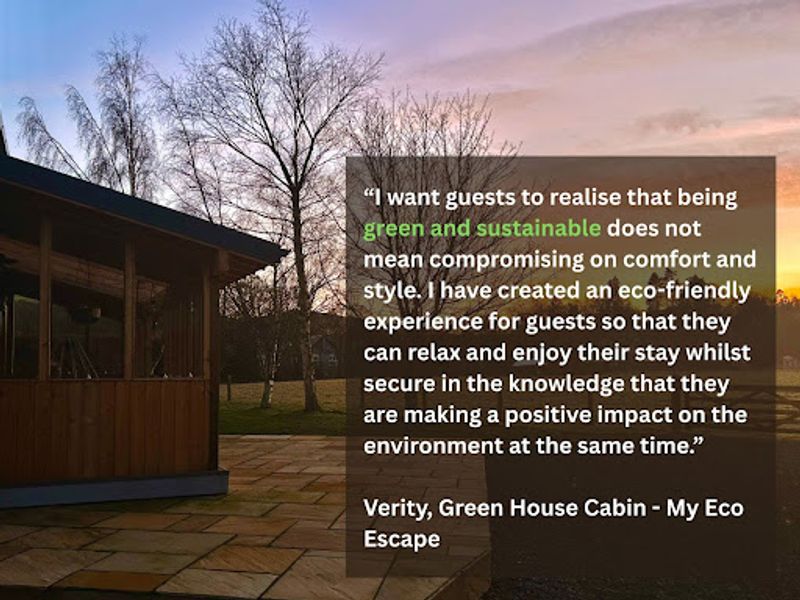
Read more about what our Eco-hosts have to offer to the guests: The Eco-Story of Inspiring Hosts at The Green House Cabin.
Why Travelers Are Making the Shift
Recent travel trends reinforce why glamping is more than just a trend—it's part of a broader shift toward conscious, meaningful experiences:
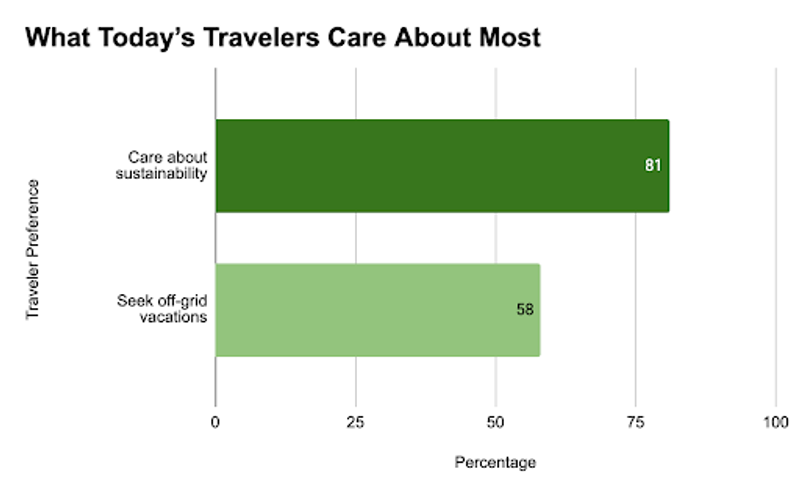
- 81% of travelers care about sustainability in travel—minimizing waste, reducing resource use, supporting local communities, and traveling during off-peak seasons (Sustainable Travel Report 2022).
- 58% of travelers say they seek off-grid style vacations to unplug and reconnect with nature (Booking.com).
Choosing canvas over concrete does make a difference.
Greener Ways to Travel
Across the UK, it's getting easier to travel low-carbon, thanks to better rail links, new electric bus routes, and loads of well-marked walking and cycling trails. Campaigns like "Leave the Car Behind" from the National Trust are encouraging people to swap car trips for greener alternatives whenever possible.
Taking the train can slash emissions significantly: according to the Department for Transport, train journeys produce up to 80% less carbon dioxide per mile compared to flights or car travel.
From Scenic train journeys of the Yorkshire Dales to the rolling South Downs, leaving the car behind is becoming not just doable, but genuinely delightful.
A Revival of Local Craft and Food
Once you arrive at your destination, the shift towards sustainable tourism continues.
Local craft markets and seasonal food festivals are thriving. Seaside towns are proudly serving up fresh, local seafood, while hillside villages are hosting bustling artisan markets full of handmade pottery, wool crafts, and homemade jam.
Buying from these local makers doesn’t just support the economy, it keeps the culture alive. According to research, the handicrafts market in the UK is expected to reach a projected revenue of US$44,255.3 million by 2030. A compound annual growth rate of 5.7% is expected of the UK handicrafts market from 2025 to 2030.

National Parks Leading the Way
The UK’s National Parks and protected areas are also stepping up in a big way.
Many now offer green-certified accommodation options, detailed car-free travel guides, and activities that give back to the environment. Think wild swimming in the Lake District, foraging walks along the Cornish coast, or helping out on a conservation day planting trees.
A National Rethinking of Travel
Taken together, all these changes point to something bigger than a trend: a genuine national rethinking of what travel could be.
One that values Purpose over habit. Presence without compromise. And a positive impact that doesn’t come at the cost of comfort. It’s about traveling in a way that makes you feel more connected to the land, to the people, and to the experience itself.
Because when you travel lightly, you don’t just leave less behind, you carry more with you.
Benefits of Choosing an Eco Escape
Choosing Eco escapes comes with benefits beyond our thoughts about travel. Here are a few:
A Different Kind of Wake-Up Call
There's something unique about waking up in a location that's alive.
Perhaps it's interrupted only by the sound of birdsong. Perhaps it's the scent of soil and wild herbs wafting through an open window. Or perhaps it's the fact that your visit isn't hurting the ground under your feet but is instead assisting in defending it.
Eco escapes don't just lessen your environmental impact, they expand your horizons. Choosing mindful, responsible travel encourages deeper learning, resilience, and a stronger connection to the world. It's not just the destinations that change. You do too!
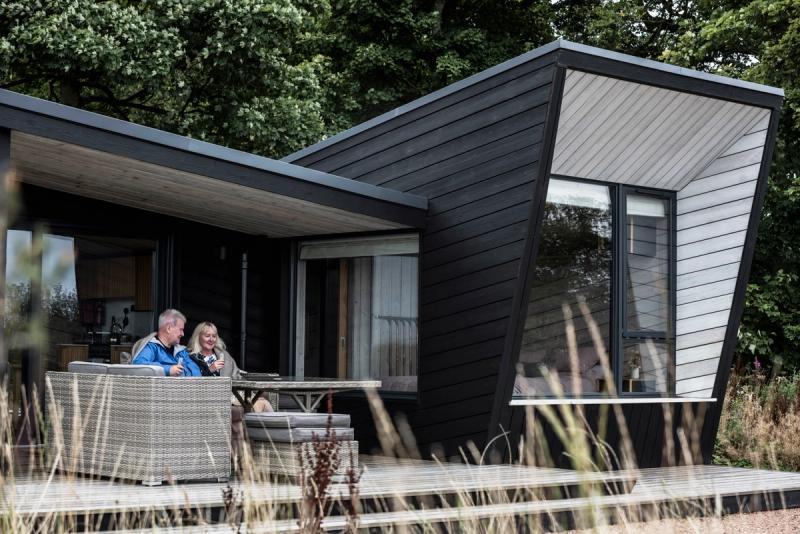
Your Money Stays Where It Matters
When you opt for a stay that's locally operated and sustainable-minded, your funds stay within the community. You're funding the individuals who raise the food, fix the cottages, lead the walks, and tell the stories. They're not some anonymous chains, the hosts who fuel with wood they cut themselves, who run off solar and composting toilets, who cook your breakfast on a wood-fired oven using eggs from their birds. The financial and emotional impact of that one reservation ripples out.
A Sense of Place, Not Just a Stay
Instead of crowded resorts or cookie-cutter packages, Eco Escapes offers something rare in modern travel: a true sense of place. Whether you’re stargazing from a firepit in Wales or learning how to make traditional jam in a Yorkshire village, the moments are intimate, unfiltered, and deeply memorable.
And then there’s the space, literally and mentally.
Surrounded by nature, free from the din of perpetual notifications or crowds, you start breathing differently. Forest walks, cold water dips, and evenings spent gazing at the sky rather than screens become your rhythm. No surprise that so many travelers find Eco Escapes a wellness retreat for both body and mind. Digital detox is a bonus, not a burden.
A Vote for a Better Future
Our recent focus on how green breaks promote mental health and local regeneration highlights true stories from travelers and hosts, showing how sustainability is not a fad, it's a journey of change.
Each Eco Escape, in its gentle manner, is also an election for a better tomorrow. When you remain in destinations that care about the planet, you're voting for the type of world you would like to wander through tomorrow.
“And if travel is supposed to broaden your horizons and open your heart, what's a more perfect way to do it?”
Sustainable travel is just a step away
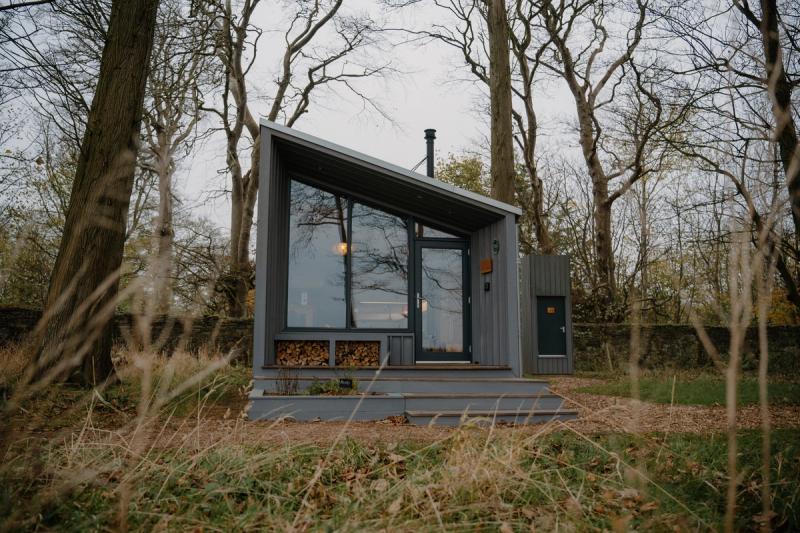
You’ve seen how travel can be different, greener, deeper, and more connected. But this is only the beginning.
Across the UK, a growing number of travelers are trading busy tourist hotspots for wild spaces where nature leads. Nowhere is this more evident than in Scotland, where rewilding efforts are restoring ancient woodlands, reviving biodiversity, and giving guests the rare chance to experience landscapes as they once were.
Staying at places like The HideAway on Cambo Estate or The Green House Cabin in Selkirk doesn’t just offer a peaceful escape; it supports rewilding initiatives that bring back native species and protect delicate ecosystems. You might spot red deer grazing in misty glens, watch golden eagles circle above, or quietly observe the reintroduction of beavers in nearby streams. These experiences aren’t manufactured; they’re part of a living, breathing return to balance.
This guide takes you deeper into this movement, showcasing how your stay can help nature thrive while giving you a front-row seat to some of the UK’s most breathtaking landscapes.
Final Tips for Planning a Green Getaway

Sustainable travel doesn’t require grand sacrifices or dramatic lifestyle changes. Often, it’s the small, thoughtful decisions-the ones made before you even leave home and that make the biggest difference.
Choose Eco-Certified Stays
Search for stays that have eco-certifications such as Green Tourism or EarthCheck. These tend to emphasize energy efficiency, water conservation, and local community support, adding a sense of purpose to your accommodation beyond comfort.
Support Local Economies
Avoid the chain restaurants and touristy shops; instead, dine at family-owned cafés, purchase items from local artists, and take tours with locals. It supports the local economy and is a more genuine experience.
Unplug and Power Down
Before you leave home, switch off plugs, lights, and heating/cooling systems. It’s a tiny habit with a surprisingly big environmental payoff, especially when multiplied by millions of travelers.
Go Beyond 'Leave No Trace
Take it a step further: join beach or trail clean-up efforts, report trail degradation, or keep a spare bag handy to pick up trash. Volunteering while you visit makes you more invested in an area.
Offset Wisely
Though carbon offsetting has been noted before, think of selecting UK-focused projects such as peatland conservation or inner-city greening schemes. Not only do they offset carbon emissions, but they also bring nature back near your doorstep.
Ready to Travel Differently?
The way we travel is changing, and that change starts with you.
At MyEcoEscape, we believe in getaways that go beyond ticking boxes. Every stay we feature has been carefully chosen for its commitment to sustainability, community, and authentic connection to nature. Whether you're dreaming of glamping under the stars, hiking through rewilded landscapes, or sipping tea in a solar-powered cabin, your next holiday can do more than just recharge you; it can restore what matters.
So take the first step toward travel that feels good and does good.
Browse our Stays and find your next Eco Escape
Plan with intention. Travel with purpose, leave a lighter footprint—and a bigger impact.
Start your green journey with MyEcoEscape
